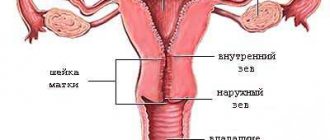IMPORTANT! OUR CLINIC DOES NOT SELL TAKEAWAY TABLETS LIKE IN A PHARMACY! AND WE DO NOT SEND THEM TO OTHER CITIES! IF YOU NEED TO HAVE A MEDICAL ABORTION, YOU CAN MAKE AN APPOINTMENT WITH A GYNECOLOGIST AND RECEIVE THE MEDICATION ONLY IN THE CLINIC AT A DOCTOR'S APPOINTMENT at the address: St. Petersburg, Shuvalovsky 37 bldg. 1.
Medical abortion is a gentle, gentle way to terminate an unplanned pregnancy during early gestation. This method is the most relatively safe for a woman’s body, does not require surgical operations, since medical abortion does not provoke heavy bleeding and eliminates the risk of infertility in the future, and is especially recommended for women who do not yet have children, so that the subsequent pregnancy is full-term. The drug blocks the normal production of progesterone, which is responsible for preserving the fetus, and causes uterine contractions, embryo rejection and termination of pregnancy.
You can get a medical abortion in early pregnancy in St. Petersburg at the Women's Health Center at Shuvalovsky 37, building 1.
What are the benefits of abortion pills?
- The tablets do not cause serious negative complications due to the use of other methods of termination of pregnancy - curettage or aspiration (obstruction of the fallopian tubes, endometritis, etc.);
- Taking the drug eliminates the risk of infertility, reproductive function is preserved, the restoration of which occurs within 2 weeks after a medical abortion;
- There is no need to go to the hospital to have a medical abortion. The procedure for expulsion of the fetus - taking medication - occurs on an outpatient basis. Bleeding, similar to moderate or heavy menstruation, which allows you to keep the abortion secret and lead a normal lifestyle;
- Medical abortion without pain. Termination of pregnancy does not cause acute pain, the patient feels familiar cramps, as during normal menstruation;
- Taking the pill leads to rapid rejection of the embryo and in most cases, even without minimal side effects, termination of pregnancy can occur.
- Using special contraceptives is the best easy method for early abortion.
Was the pregnancy terminated?
To confirm the completion of the procedure, after 14 days the woman undergoes a control ultrasound examination. A blood test for hCG may also be performed. During control diagnostics, the doctor assesses the condition of the genital organs and the patient’s body as a whole. The risk of complications after a medical abortion in a medical facility is minimal.
If remains of fetal tissue are detected in the uterus, the woman undergoes surgical curettage. In this case, the identified remains of the fertilized egg are removed using surgical instruments - curettes. The intervention is performed under general or local anesthesia. The medical center in St. Petersburg has the necessary equipment to complete an abortion even in severe cases.
It is impossible to determine which pills are best for abortion on your own. In most developed countries of the world, abortifacients are not sold freely in pharmacies. Their use is permissible only in a hospital setting. A responsible approach to the procedure reduces the risk of complications to 3-5%.
What pills to use to terminate an early pregnancy, how to avoid complications, how much does a medical abortion cost - the gynecologists of the Diana clinic will answer all your questions. Information for registration can be found on the clinic website.
ONLINE REGISTRATION at the DIANA clinic
You can sign up by calling the toll-free phone number 8-800-707-15-60 or filling out the contact form. In this case, we will contact you ourselves.
If you find an error, please select a piece of text and press Ctrl+Enter
Classification
Early pregnancy termination pills used in the Russian Federation are classified depending on the period of use:
| Type | Period of use | Product effectiveness | Product name |
| For emergency contraception | No later than 24/72 hours after unprotected intercourse | The pills will prevent the fertilized egg from attaching to the uterine wall |
|
| Termination of pregnancy before 5 weeks | Up to 7 weeks from the start of the last menstrual period | The tablets interfere with the production of progesterone, changing the phase of the menstrual cycle |
|
| Antiprogestogens | Up to 9 weeks from the start of the last menstrual period | The tablets promote prostaglandin synthesis and uterine contraction |
|
What drugs are used
For medical abortion, at the first stage, medications with the active ingredient mifepristone are used.
Mifegin is an original drug that was created and produced in France. Available in a dosage of 200 mg, 3 tablets per package. It has high bioavailability, a stable formula, is quickly absorbed into the systemic circulation, and evenly reaches its maximum concentration.
The synthetic steroidal antigestagenic drug Mifegin causes the death of the fertilized egg and its rejection from the uterine wall, and increases the contractility of the myometrium. After a single dose, the maximum concentration is reached after 1.3 hours.
The tablets have a micronized formula of the substance, so the absorption process is stable and fast.
Generics of Mifegin are produced by other pharmaceutical manufacturers under the following trade names: Miropriston (Russia), Mifeprex (Russia), Mifepristone (Russia, China), Pencrofton (Russia). Non-original medicines have the same active ingredient, but differ in particle size, bioavailability, speed of reaching maximum concentration in the blood and the presence of auxiliary components.
For the second stage, medications with misoprostol are used in a dosage of 200-400 mcg once.
Topogin is an original French drug, a synthetic analogue of prostaglandin E. It causes contraction of the smooth muscles of the uterus and dilates its cervix, which leads to termination of pregnancy. Reaches maximum concentration 30 minutes after application, the effect lasts from 3 to 6 hours.
Generics of Topogin: Misoprostol (China), Mirolut (Russia).
The cost of drugs is usually included by the medical institution in the package of measures to terminate pregnancy.
Escapelle
Refers to emergency contraception. One unit contains 1.5 mg levonorgestrel.
Experience has shown the effectiveness of the product after:
- Unprotected sexual contact;
- Ineffective adoption of barrier methods of contraception;
- Spontaneous sexual intercourse;
- Rape.
Action of the product
The drug Escapelle completely blocks the activity of estrogen and prevents the possible fertilization of a woman’s egg. If the terms of use are observed, the product provides a proven effectiveness of 97%.
Terms of use
The tablet should be taken within 72 hours after sexual intercourse, regardless of food intake or day of the menstrual cycle.
Contraindications to the use of the drug
- Individual intolerance to components;
- Liver or kidney failure;
- Lactose intolerance;
- Impaired intestinal absorption;
- Age up to 16 years.
Possible health effects after using the product
- Will cause headache;
- Discomfort in the lower abdomen;
- Digestive disorders develop;
- Allergic reactions;
- Bloody vaginal discharge not associated with the onset of menstrual bleeding;
- Failure of the menstrual cycle for 5-7 days.
Pregnant girls under 16 years of age are allowed to take Escapelle in case of rape. Escapelle tablets are not recommended for use twice in the same menstrual cycle. You can purchase the drug only with a doctor's prescription. The price of the medicine is about 500 rubles.
What to do after a medical abortion?
Despite the gentle nature of this procedure, after it is carried out, the following restrictions are imposed on the woman’s life for 7-10 days:
- It is prohibited to use hygienic tampons, use vaginal baths and douching;
- It is necessary to exclude heavy physical activity, sports, as well as taking a hot bath or shower (warm is allowed), going to the bathhouse, sauna or pool;
- Drinking alcoholic beverages is prohibited (alcohol can increase bleeding), smoking is allowed, but very limited;
- The use of non-steroidal anti-inflammatory drugs should be limited or eliminated.
Separately, it is necessary to say about sex life after medical abortion. Due to the fact that the uterus needs some time to restore the integrity of the epithelium, it is necessary to exclude any sexual intercourse for 2-3 weeks after the procedure, however, sexual intercourse can be resumed as soon as the bleeding has stopped. In any case, before medical intervention you need to consult with a specialist, fill out the form below and get recommendations and advice: Make an appointment
Genale
These are synthetic pills for emergency contraception, which contain an active ingredient such as mifepristone (available at 10 mg per unit).
The instructions indicate the pharmacological action of the drug
- Blocks the action of progesterone at the receptor level;
- Prevents ovulation;
- Prevents the attachment of the fertilized egg to the wall of the uterus.
How to use the drug
The tablet must be taken once 2 hours after a meal and no later than 72 hours after unprotected sexual intercourse.
Contraindications to the use of Zhenale
- Diseases of the adrenal glands;
- Chronic kidney disease or liver failure;
- Long-term therapy with corticosteroids;
- Impaired hemostasis, anemia;
- The presence of severe extragenital pathologies.
Side effects from the drug
- Cramps in the lower abdomen;
- Diarrhea and other stool disorders;
- Conditions of nausea, vomiting;
- Headache.
The price of a package of the medicine is about 450 rubles and it can only be purchased with a doctor’s prescription.
How it happens
Termination of pregnancy with the help of medications can be one- or two-stage. To determine the tactics and method of carrying out this procedure, you must consult a gynecologist.
Methods:
- In one step. When deciding to have a one-stage abortion, a woman takes a drug that blocks the activity of progesterones. Because of this, the endometrium stops growing, and the body begins to increase the production of oxytocin. This element leads to an increase in the contractility of the uterus, as a result of which the fertilized egg detaches from the wall and comes out.
- In two stages. This method is necessary in case of prolonged attachment of the fertilized egg to the uterine walls. The first stage is the same as with a one-stage interruption - the same drugs are used. Two days after taking the first medication, it is necessary to take a second one - with a high content of prostaglandins. Their action increases the activity of uterine contractions, compresses the myometrium and increases tone.
To perform a medical abortion procedure correctly and safely, you must follow certain instructions:
- Make an appointment with a gynecologist. You can visit a specialist at a clinic at your place of residence, or you can choose the required specialist in a private center, based on reviews. If you choose a private specialist, you must make sure that the center and the doctor have the right to conduct a specialized appointment. This can be done by reviewing licenses and certificates.
- The primary examination for planning a medical abortion is an ultrasound examination of the pelvic organs. This procedure will show the location of the fertilized egg in the uterus or appendages, the approximate duration of pregnancy and the condition of the organs in general.
- The next step is to check the laboratory tests. It is necessary to take clinical and biochemical blood and urine tests so that the doctor can assess the general condition of the body. In public clinics, the results are ready the next day; in private clinics, a rapid analysis can be performed in a couple of hours.
- A consultation conversation follows. The gynecologist will tell you how the medical termination of pregnancy will be carried out, how the drug works, possible symptoms and manifestations. It is necessary to fill out a special form - information consent that the entire procedure is carried out consciously, all necessary recommendations and instructions are explained.
- After filling out all the necessary documents, the woman takes a special drug that will be used to terminate the pregnancy. The first two hours will need to be spent under the supervision of medical staff to exclude side effects and complications. After 2 hours you can go home; it is recommended to spend this day in a calm environment, it is best to stay in bed.
- With a two-stage interruption, after two days you need to take the drug again, for this you should again contact the selected clinic.
- Standard symptoms of medical termination of pregnancy are nagging pain in the lower abdomen, which periodically intensifies. Bloody discharge should come out gradually, throughout the day, small clots are allowed.
- When the entire process of abortion is completed, heavy menstrual-like discharge appears. The duration of such discharge should not exceed two weeks, on average they last 10 days. After their completion, it is necessary to undergo another examination - ultrasound of the pelvic organs and clinical tests. If the hemoglobin level in the blood is low, it is necessary to prescribe iron supplements to restore it. If there are residual elements of the fertilized egg in the uterine cavity, the woman is referred to a vacuum aspiration procedure.
- If the painful sensations become severely cramping, you can take antispasmodic drugs to reduce them. The drugs of choice are no-shpa and drotaverine, since their action is the most acceptable in this situation. It is worth noting that taking some medications slows down and worsens the effect of the drug for abortion, so it is necessary to tell the gynecologist about the treatment being carried out.
- A completely normal course of the menstrual cycle is restored a month after successful medical termination of pregnancy.
When visiting a clinic or private center, you should find out about psychological support services. A preventive conversation with a psychologist is necessary to return to a full life.
If on the day of a medical abortion the pad fills with blood very quickly, you should immediately seek medical help to eliminate acute bleeding. Otherwise, there is an increased risk of health hazard.
Mifegin
Mifegin contains about 20 mg of micronized mifepristone, and is used to terminate early pregnancy.
Action of Mifegin
- This French drug stops the process of progesterone production in humans by blocking receptors;
- Mefigin provokes active contraction of the myometrium;
- Promotes embryo rejection in a woman’s early pregnancy.
Contraindications to the use of Mefigin are:
- Liver or kidney dysfunction;
- Patients with adrenal gland problems;
- Inflammatory processes of the genital organs;
- Porferia;
- Poor blood clotting;
- Low hemoglobin level
- Asthma.
Possible side effects after using Mefigin
- Drowsiness;
- Nausea;
- Diarrhea;
- Vomit;
- Headache.
The use of the drug is permissible only in specialized gynecological institutions. The procedure is carried out as prescribed and under the supervision of a doctor. Use is possible only if there is no threat of developing an ectopic pregnancy.
Life after a frozen pregnancy
A non-developing pregnancy, even in the earliest stages, is a serious psychologically traumatic factor for the whole family. The most important question is “Why did this happen?” doctors often leave no answer. However, we tried to name the main reasons in the previous article.
But in fact, it is much more important to answer another question: “What to do now and how to prevent it in the future?” First of all, it is necessary to resolve the issue of evacuation of the products of conception from the woman’s uterus.
Waiting tactics
If the pregnancy has stopped developing within a short period of time, you can simply wait. In 2010, the results of a study1 were published, in which 282 women with undeveloped short-term pregnancies took part.
203 patients agreed to watchful waiting. Within two weeks after diagnosis, the uterine cavity emptied spontaneously in 61%. With anembryony (when the fertilized egg develops perfectly, but there is no embryo in it), self-cleaning of the uterus occurred in 53% of cases, and in case of embryo death - in 35%.
In more than a third of women (36.5%), the fertilized egg did not go away on its own; doctors had to switch to using other methods. Only 2.5% experienced heavy bleeding or infectious and inflammatory complications during the two weeks of waiting, which required emergency medical care.
In our country, wait-and-see tactics are not prohibited, but they are not very encouraged. Our distances are long. In case of bleeding, you can wait only in a 24-hour hospital. Despite the fact that almost half of patients have a good chance of avoiding medical interventions, this strategy is still considered risky and is not common in practical healthcare.
Medical evacuation
The expulsion of a dead fertilized egg from the uterine cavity can be done with the help of medications (prostaglandin analogues). This is a worthy alternative to the surgical method, and today it is chosen by 20% of women. The effectiveness of drug expulsion varies widely - from 13 to 96% - and depends on the stage of pregnancy, the type of anomaly, the dose of the drug used and the route of administration. The procedure can be performed on an outpatient basis or in a 24-hour hospital setting. Control ultrasound is performed after 10–14 days.
The advantages of the medicinal method include the absence of painful procedures, anesthesia and anesthesia. The disadvantages are the likelihood of fairly prolonged bleeding and some chance that the procedure will be ineffective. The legality of this procedure in the Russian Federation was finally confirmed in 2021 by the Federal Clinical Protocol2.
Surgery
Back in 2006, at the XVIII Congress of FIGO (International Federation of Obstetricians and Gynecologists) in Kuala Lumpur (Malaysia), it was proposed to consider a non-developing pregnancy combined with chronic inflammation of the endometrium (inner lining of the uterus) in 100% of patients, regardless of the cause of gestational arrest. This means that now, after the diagnosis of “non-developing pregnancy,” the doctor must put a comma and add “chronic endometritis.” And this also means that today the tactics of emptying the uterine cavity have been fundamentally changed. The barbaric method of curettage of the uterine cavity, which was used for many years in the Russian Federation, is now a thing of the past.
Today, all over the world (Russia is also catching up), gentle vacuum aspiration of the contents of the uterine cavity is considered the standard. If curettage required general anesthesia, then vacuum aspiration in most cases can be performed on an outpatient basis using local anesthesia. The procedure is much shorter in time and much less traumatic. The advantages of this tactic include rapid completion of the process, the ability to stop bleeding and remove infected tissue in complicated cases of the disease.
One of the advantages of surgical tactics (vacuum aspiration) is the ability to conduct studies of the removed material. Firstly, this is a morphological study (histology), which will be carried out by a pathologist. Secondly, this is a cytogenetic study that allows us to study the chromosome set of the failed fetus. Thirdly, this is a molecular genetic study, which is especially good at identifying chromosomal abnormalities. Such analyzes help answer the question “Why did this happen?” and plan further tactics, however, given the high cost, they are not mandatory and are carried out at the request of the woman.
Life after loss
After the products of conception are evacuated from the uterine cavity, the most important thing begins. First, it is necessary to immediately begin treatment for chronic endometritis. Therapy is carried out in the first 3 months after pregnancy loss and may include hormonal correction, physiotherapy, and spa treatment. Antibiotics are prescribed according to strict indications, only in cases where the influence of infectious factors has been proven. Secondly, we need to start preparing for the next pregnancy. The optimal period for conception occurs already 3-6 months after the “frozen” pregnancy, so there is no time to cry, we need to start working.
To prevent gross developmental anomalies and defects incompatible with the progression of pregnancy, you should urgently start taking medications with folic acid. It is important to remember that folate levels build up very slowly, so you should start immediately after pregnancy loss. Only in this way can normal neurulation be ensured (formation of the neural tube during embryogenesis). Since people cannot live on folate alone, doctors recommend finding and eliminating deficiencies of other vitamins and microelements, primarily B vitamins (B6 and B12), vitamins E and D, iron, calcium and iodine.
Starting to take folates after pregnancy does not play any role: everything that could break has already broken. It is important to consider that in Russia every second woman is a carrier of a defective allele of the gene encoding the enzyme 5-methyltetrahydrofolate reductase (5-MTHFR). Because of this, folic acid may be poorly absorbed. We talked about the heroic MTHF here.
If the failed pregnancy was desired but unplanned, preconception preparation should be undertaken in accordance with Federal clinical guidelines. It is important not to forget to sanitize all foci of chronic infection (especially teeth and ENT organs), eliminate functional disorders of the digestive tract in the form of constipation and dyskinesia.
Training tasks include the identification and treatment of extragenital diseases: arterial hypertension, diabetes mellitus, hypothyroidism, systemic connective tissue diseases, kidney and urinary tract diseases, including infectious diseases. Getting rid of alcohol, nicotine, drug addiction, and correcting eating disorders are absolutely mandatory.
The most important thing is not to give up, don’t miss the little things and believe that everything will definitely work out.
Oksana Bogdashevskaya
Photo istockphoto.com
1 Casikar I. et al. Expectant management of spontaneous first trimester miscarriage: prospective validation of the 2-week rule // Ultrasound. Obstet. Gynecol. 2010. Vol. 35(2). P. 223–227. [PMID: 20049981]
2 Miscarriage in early pregnancy: diagnosis and management tactics. Clinical recommendations (treatment protocol). M., 2021.
Agesta
This is a drug used to terminate early pregnancy. The tablets contain synthetic antigestagens, mifepristone at a dosage of 10 mg/1 unit.
Action of the medicine
- Destruction of the fetal egg shell and its rejection;
- Stimulation of uterine contractions;
- Opening the cervix to cleanse it.
This drug has a number of medical contraindications
- Kidney or liver diseases;
- Heart pathologies;
- Poor blood clotting;
- Iron deficiency;
- Porphyria;
- Individual intolerance to components.
Rare side effects from the procedure
- Vomiting;
- Diarrhea;
- Headache;
- Painful sensations in the lower abdomen.
Agesta price from 870 rub.
Miscarriage between 12 and 22 weeks
Such a miscarriage is considered late. Its causes coincide with the causes of early miscarriages (anatomical, immune, infectious, endocrine).
At this time, miscarriage also occurs due to isthmic-cervical insufficiency - the weak cervix cannot hold the fetus and dilates. For this reason, miscarriage can occur in the 2-3 trimester. Isthmic-cervical insufficiency is observed in 15.0-42.7% of women suffering from miscarriage. Careful monitoring of the pregnant woman allows you to identify the problem in time and perform surgical correction of the cervix before the onset of labor.
For isthmic-cervical insufficiency, there is only one treatment method - mechanical narrowing of the cervical canal. To do this, the neck is either sewn up or a special ring is put on it. However, the latter method is less effective, because the ring can easily slide off the neck, then it will no longer hinder the process of its opening.
After suturing, if necessary, it is possible to use antibiotics and drugs that normalize the vaginal microflora. Treatment of the vagina and monitoring of the condition of the sutures is carried out daily for 5 days. Sutures are removed at 37-38 weeks and in case of premature onset of labor.
Isthmic-cervical insufficiency can be primary (for no apparent reason), or can be a consequence of abortion or hormonal disorders (increased levels of androgens - male sex hormones or their precursors).
Miscarriage after 22 weeks
Such a loss is difficult to forget. Obstetricians talk about premature birth after the 28th week of pregnancy. Traditionally, a child born after this period is considered viable. But medicine knows of many cases where it was possible to save the lives of earlier children.
We recommend that you be thoroughly examined for miscarriage, check the above factors. In addition to them, the cause of miscarriage can be antiphospholipid syndrome, while the woman’s body perceives the child as something foreign and rejects it. This disease, like the others listed, can be corrected, i.e. You have a very real chance of bearing a child.
Miscarriages due to hemostasis disorders
All of the above reasons account for only 30-40%. Up to 70% of miscarriages are caused by disorders in the blood clotting system (hemostasis).
Disorders of the blood coagulation system that lead to pregnancy loss can be divided into thrombophilic (increased coagulation) and hemorrhagic (tendency to bleeding). Both of these extremes are dangerous for the fetus. Various disorders leading to the formation of small blood clots lead to the fact that the fetus loses sufficient blood supply, development is disrupted and the fetus is rejected.
Major hemorrhagic changes can appear in childhood in the form of increased bleeding during cuts, tooth extraction, and the onset of menstruation. But sometimes they manifest themselves only during pregnancy and cause miscarriage. Early bleeding and chorionic detachment are difficult to stop.
You may not realize it, but strange headaches, weakness, fatigue, and a temporary decrease in sense of smell or hearing may be symptoms of disorders in the blood coagulation system.
When planning a pregnancy, you need to undergo a genetic examination and, if necessary, begin treatment.
It is advisable to be examined for hidden hemostasis defects even for those who consider themselves healthy. This will make it possible to predict the occurrence of complications and prevent loss. Early therapy can prevent miscarriage in 98% of cases. If hemostasis defects are discovered already during pregnancy, it can be difficult to maintain it.
What to do after a miscarriage?
Find out the reason! The ideal option is for future parents to be examined: it is much wiser to postpone conception and spend two to three months identifying the reasons than to risk getting pregnant again, spend two months waiting, and then lose everything again and still go to the doctors.
Until you understand the reason, it will not evaporate. In most cases, the answers lie on the surface. Take care of your health and your future baby.
Make an appointment with an obstetrician-gynecologist by calling +7(495)150-60-01
Tyan Oksana Aleksandrovna Head of department, obstetrician-gynecologist Doctor of the highest category Work experience: 25 years
Maksimova Tamara Anatolyevna Obstetrician-gynecologist Work experience: 6 years
Zabolotnova Olga Valentinovna Obstetrician-gynecologist Doctor of the first category Work experience: 24 years
Moiseeva Alla Vitalievna Obstetrician-gynecologist, ultrasound diagnostics doctor First category doctor Work experience: 36 years
Volkova Polina Dmitrievna Obstetrician-gynecologist, ultrasound diagnostics doctor Doctor of the highest category Work experience: 34 years
Postnikova Nadezhda Anatolyevna Obstetrician-gynecologist, ultrasound diagnostics doctor Work experience: 34 years
Shchelokova Elena Nikolaevna Obstetrician-gynecologist Doctor of the highest category Work experience: 37 years
Pencrofton
The main function of the composition is to suppress progesterone due to the content of about 200 mg of mifepristone in 1 unit.
Pencrofton action
- Prevents the production of progesterone at the receptor level;
- Activates fetal rejection by the myometrium;
- Causes uterine contractions.
Under the influence of a dose of Pencrofton, an abortion occurs - miscarriage and removal of the fetal egg.
The drug has individual contraindications
- Individual intolerance;
- Chronic renal or liver failure;
- Anemia;
- Porphyria;
- Uterine fibroids;
- Infectious disease of the genital organs;
- Ectopic pregnancy.
Side effects in some patients
- Nausea;
- Dizziness;
- Chills;
- Diarrhea.
Pencrofton tablets can only be purchased at a healthcare facility directly from a healthcare professional or doctor.
Until what time is medication interruption required?
When a girl shows the first signs of pregnancy, she turns to a gynecologist to register and receive the first recommendations. The doctor conducts an examination, prescribes tests, and determines the patient’s attitude towards the upcoming birth of a child. She has the right to ask a specialist all questions regarding her health if a woman decides to undergo a medical interruption. The gynecologist explains at what stage a medical termination of pregnancy is performed, what the consequences are and explains how the process itself works.
Medication interruption in the early stages is the main condition for the successful implementation of the procedure. Medication interruption is done within a period of up to 5 weeks. (42 days of delay) During this period, the fertilized egg does not have time to attach to the mucous membranes of the uterus, so with the help of drugs it becomes possible to remove it from the body. This does not involve surgical intervention with the risk of damage to the internal genital organs.
The drug Ginestril
Contains 50 mg mifepristone per unit.
Method of action
- Blocks the production of progesterone;
- Promotes spontaneous miscarriage, under its influence abortion occurs.
The drug has medical contraindications
- Endometrial hyperplasia;
- Uterine fibroids;
- Neoplasms on the genitals;
- Anemia;
- Individual intolerance;
- Problems with the liver or kidneys.
Side effects after using the product
- Migraine;
- Pain in the lower abdomen;
- Nausea and vomiting;
- Stool disorders;
- General weakness.
Dispensed in pharmacies strictly according to a doctor's prescription.
Short term consequences
This group includes negative consequences, the development of which occurs almost immediately after taking mini-abortion pills.
Nausea and vomiting
The most common symptom among gastrointestinal disorders is nausea. It is caused either by the drug itself or as a result of a miscarriage.
Vomiting is observed in approximately 44% of patients when taking Misoprostol orally, and in 31% when using the drug intravaginally. Studies have also found that the incidence of vomiting depends on the time interval between taking the hormonal pill and the prostaglandin. If you observe an interval of 7-8 hours, then the likelihood of vomiting is lower than with an interval of 24 hours.
Allergic manifestations
An allergy, as a side effect of a medical abortion, can develop to the constituent components of any of the pills taken. It is most often detected by urticaria or other rashes. The most severe allergic symptom, such as Quincke's edema, occurs very rarely. To prevent this, it is better to stay in the clinic for several hours after using the drug under the supervision of medical workers.
Diarrhea
Functional disorders of this kind are observed in 36% of patients when taking Misoprostol orally and in 18% when using the drug intravaginally. The severity of this side effect varies. In this case, anti-diarrhea medications may be ineffective - it generally stops on its own after a few hours.
Intense pain in the abdominal area
This side effect occurs as a result of spasm of the uterine muscles and is normal. It manifests itself in almost all women and can be expressed in different ways: from mild pain to unbearable pain. It manifests itself most intensely half an hour to an hour after taking Misoprostol and stops after abortion. The pain may also be accompanied by cramps. It is worth noting that at a shorter stage of pregnancy it is less pronounced.
All short-term negative consequences usually go away on their own and do not need to be treated separately. But if they are very pronounced, then symptomatic medications can be used.
Mytholian
Mifolian tablets are a progesterone antagonist; they contain mifepristone in an amount of 200 mg.
Action of the product
- Increases uterine contractility;
- It provokes abortion - rejection and release of the fertilized egg from the uterine cavity.
A day after treatment with this medication, the patient is additionally prescribed to take proglandins.
Admission has contraindications
- Age less than 18 years;
- Kidney or liver dysfunction in a woman;
- Blood clotting disorder;
- Iron deficiency in the blood;
- The presence of inflammatory diseases in the reproductive organs;
- Individual intolerance to components.
Side effects
- General weakness;
- Dizziness;
- Nausea;
- Headache;
- Cramps in the lower abdomen.
The drug can be purchased with a doctor's prescription, its price ranges from 1,500 to 2,500 rubles.
Possible complications
Despite the small number of complications, it is possible to determine why medical abortion is dangerous. In 85% of cases, adverse reactions in the form of abdominal pain and bleeding are moderate and no special treatment is required.
In other cases, manipulation can lead to the following complications:
· severe pain syndrome;
· profuse bleeding;
· temperature;
· incomplete abortion;
· progressive pregnancy.
Pain in the lower abdomen is observed during the period of expulsion of abortion products. Its intensity may vary, but the individual tolerance threshold also matters.
Bleeding is considered significant if you have to change two pads in an hour, and this condition lasts for at least 2 hours. In this case, vacuum aspiration of the contents of the uterus is indicated in order to stop it. In severe cases, surgical cleaning is performed.
In 2-5% of cases, medical abortion is incomplete. Then it is also necessary to perform vacuum aspiration or curettage of the uterine cavity. Less than 1% of cases result in pregnancy progression. If a woman insists on an abortion, then invasive methods are used. Those who have changed their decision must be informed about the possible teratogenic effect of the drugs on the fetus. But there is not enough data to confirm this fact.
Taking medications may cause a slight increase in temperature, but this lasts no more than 2 hours. If the fever lasts for 4 hours or more or occurs one day after taking Misoprostol, this indicates the development of an infectious process. A woman with these symptoms should consult a doctor.
Other complications in the form of dyspeptic symptoms may be a sign of pregnancy itself. For allergic reactions, treatment with antihistamines is necessary.
Cytotech
It is an abortifacient drug containing about 0.2 mg of misoprostol.
Action
- Stimulates myometrial contraction;
- Promotes the opening of the cervix and the removal of the fertilized egg.
Contraindications
- Impaired kidney or liver function in a woman;
- Individual intolerance to the components of the drug.
- Presence of cardiovascular pathologies;
- Hypersensitivity to components;
- Endocrine system disorders;
- Anemia;
- The presence of hormone-dependent tumors;
- Age up to 18 years;
- Ectopic pregnancy;
- Intrauterine device.
Side effects
- Headache;
- Diarrhea;
- Drowsiness;
- Mild clouding of consciousness;
- Vomit.
Tablets should only be used in combination with Mifepristone, exclusively in inpatient medical conditions under the supervision of a physician. The drug can only be purchased with a doctor's prescription, its price starts from 1,300 rubles.
Contraindications and restrictions to the use of medical abortion
This method has a number of contraindications that must be taken into account when using it to prevent complications:
- Ectopic pregnancy - in this case, the fetus detached from the endometrium will not be able to leave the mother’s body naturally;
- Inflammatory diseases of the reproductive system, pelvic organs and abdominal cavity - being a hormonal (steroid) drug, Mifepristone can aggravate the course of inflammatory processes;
- Medical abortion is also contraindicated in pathologies such as anemia, bronchial asthma, liver and kidney failure, hemorrhagic syndromes, etc.;
- Mifepristone is incompatible with a number of other medications, such as corticosteroids, anticoagulants (heparin).
In addition to contraindications, this method also has limitations - cases when its use should be carried out more carefully:
- It is not recommended for women over 35 who smoke (more than 10 cigarettes per day);
- The presence of sutures and scars on the uterus after surgical operations on it;
- Hypertension, breastfeeding, etc.
A certain danger of medical abortion is that women often turn to this method of terminating a pregnancy on their own, without being under the supervision of a qualified doctor. In such cases, contraindications are often ignored and not certified drugs are used, but their low-quality analogues or substitutes with low effectiveness and extensive side effects.
Rules for using emergency contraceptive pills
Do I have to wait 72 hours to take emergency contraception?
In no case! The sooner you take the pill, the higher the chance of confirming the effect and preventing pregnancy. Emergency contraceptive medications can be used immediately or up to 72 hours after unprotected sex. Modern contraceptives allow you to save yourself from the subsequent need to have an abortion with just one pill.
How effective are medications to prevent pregnancy?
The effectiveness of emergency contraception depends on the number of hours and days that have passed since unprotected sex:
- Within 24 hours - 95%;
- Between 25-48 hours - 85%;
- Between 49-72 hours - 58%.
How often can you use emergency contraception?
Emergency contraception cannot be used as a permanent method of contraception and should be used as rarely as possible (no more than once per menstrual cycle).
Indications and contraindications for drug interruption.
A gynecologist, diagnosing a patient with a desire to terminate a pregnancy, answers first of all the main question: when is it better to interrupt the development of the fetus? You can do a medical abortion . If the pregnancy period is up to 5 weeks, this option is acceptable. Based on the results of tests and examination of the girl, the specialist identifies indications for a medical and social procedure.
These include:
- the woman has diseases that threaten the proper development of the fetus;
- bad habits of the expectant mother - smoking, systematic use of alcohol, drugs, which causes intoxication of the body;
- pathologies in the development of the child are observed.
Contraindications to drug interruption:
- ectopic pregnancy diagnosed;
- as a result of an ultrasound examination, pathologies of the internal genital organs were identified;
- presence of untreated infection;
- allergic reactions of the body to hormonal drugs that cause abortion;
- pregnancy period is more than 5 weeks;
- the presence of cardiovascular diseases, problems with the liver, kidneys, adrenal glands.
In these cases, the procedure for taking medications is prohibited even if the woman wishes. The doctor has the right to offer her other methods, but only after consultation with specialists.
Rules for using pills to terminate early pregnancy
The most effective regimen for using abortifacient drugs is as follows:
- Use of products containing Mifepristone;
- Prostaglandin use.
The first stage of the regimen consists of taking tablets containing 600 mg of the active substance - Mifepristone. The second stage begins after 48 hours, and the patient must take 2 prostaglandin tablets, each containing 0.4 mg of the active substance - Misoprostol.
Most women, after using this regimen of pills, experience a medical abortion - termination of an early pregnancy, accompanied by symptoms of heavy menstruation. In most cases, a woman begins bleeding the very next day after taking the pills during the first stage of an abortion.
Almost all medical institutions allow the patient to drink prostaglandin at home.
A medical abortion can be performed only after an ultrasound examination confirming the presence of pregnancy and the permissible period.
How can you be sure that a miscarriage has occurred?
Sometimes bleeding is not a guarantee that a medical abortion has occurred and the pregnancy has been terminated. You need to take a pregnancy test in the first 2-3 weeks after taking the drugs.
Usually, after an abortion, blood clots remain in the uterine cavity. They are not considered dangerous to the body if there are no accompanying symptoms in the form of fever, etc., and come out along with menstruation that occurs after termination of pregnancy.
General contraindications
The procedure has its own characteristics and contraindications, the presence of which excludes any type of termination of pregnancy, including medical abortion. How the pregnancy is going, the woman’s well-being and other features - everything should be taken into account.
The procedure is excluded in the following cases:
- In the acute form of an infectious disease.
- In the presence of an inflammatory process in the body, including in the intimate area.
- When diagnosing an ectopic pregnancy
- Intolerance to substances included in the drug. In such a situation, the doctor may recommend another remedy that is suitable for you.
- Having problems with the kidneys and liver.
- Serious heart and vascular diseases.
- Anemia.
- Breastfeeding, since substances are absorbed into the blood and pass into breast milk.
- In a situation where protection was provided for a long time using oral contraceptives, and their use was stopped immediately before pregnancy.
- Inflammation of the stomach (gastritis, gastroduodenitis, ulcer).
- The presence of a scar on the uterus.
If one of the above contraindications is present, termination of pregnancy is impossible, and the pathological process must be treated. Otherwise, the risk of complications increases greatly.
Preparing for the abortion procedure
To successfully complete the procedure, a woman must contact her doctor and strictly follow his requirements and advice. At the first appointment, the doctor will tell the woman how a medical abortion works. The patient will need to try to establish the exact date of conception, undergo an ultrasound examination to exclude ectopic pregnancy, and also undergo a series of tests.
Preparing for medication interruption.
If a girl decides to have a pharmacological abortion, she needs to see a gynecologist for tests and diagnostics of reproductive health. Carrying out these procedures is mandatory, since the doctor must determine the duration of pregnancy. Having received an answer to the question of when it is better to make a medical interruption, having understood the risk of adverse consequences, the patient makes the final decision about the procedure.
Preparatory activities are:
- Blood donation for blood group and Rhesus affiliation and general blood test, as well as syphilis, HIV, hepatitis.
- Referral for ultrasound examination.
- General urine analysis.
- Taking a swab from the vagina to check for bacteria.
- Conducting a coagulation test to confirm the absence of bleeding disorders.
Abortion drug
5-7 days before taking the medications, the woman is advised not to drink alcohol, stop smoking, and adhere to proper nutrition.
Medication interruption - “Rehabilitation”.
The interaction between the patient and the gynecologist after the procedure is constant. If the procedure was not complicated by side effects and was successful, you should discuss several points on further protection, features of the menstrual cycle, and self-care. The success of an abortion depends on the period at which it was performed. Before the medication is taken, the doctor reminds the woman until what time a medical abortion can be performed. After 5 weeks it is contraindicated for the female body.
Menstrual irregularities
Hormonal medications taken during abortion do not affect the menstrual cycle. According to the plan, bleeding begins 30-50 days after the abortion. A woman should understand that these drugs do not affect the ovulation process, so contraceptive options should be considered. The first sexual intercourse is allowed after the first menstruation. If it does not start within 1 month, you should consult a doctor.
Planning pregnancy after medical termination.
After a medical abortion, doctors talk about planning pregnancy after 6 months. This period is enough for the body to fully recover. Usually, the doctor suggests taking oral contraceptives, which ensure reliability during further sexual activity before planning a pregnancy. It is believed that conceiving a child before six months after an abortion can lead to complications:
- ovarian hyperstimulation with the formation of hormonal cysts;
- ectopic pregnancy;
- miscarriage;
- anemia.
Consulting with a gynecologist about how the recovery process occurs, what measures to take for a speedy recovery, will provide an opportunity to go through a quality rehabilitation period.
Self-care after medication interruption.
Monitoring your own reproductive health and proper care of your genitals are a guarantee of recovery after a medical procedure. How quickly this happens depends on how many weeks into the abortion the abortion took place. The sooner the procedure is performed, the easier the rehabilitation will be for the woman.
Doctors recommend:
- do not give up contraception;
- for 1 month, avoid being in rooms with high temperatures or hypothermia;
- do not take hot baths;
- strengthen the body's immune system;
- adhere to a healthy diet, eat foods rich in vitamins;
- sexual rest 1 month before the onset of menstruation;
- give up bad habits - smoking, drinking alcohol;
- avoid intense physical activity;
- avoid overwork.
By following these rules, it will be easier for the girl to go through the rehabilitation period.
Regimen for taking pills for medical abortion here and in Europe
There is no universal scheme for medical abortion with these drugs. Each gynecologist chooses a method he has tested, which gives the best result without complications. An obligatory point is to assess the woman’s condition (age, number of births, body weight, hormonal levels, etc.). Therefore, information on dosages of medications for termination of pregnancy is provided for informational purposes only.
So, in the instructions for mifepristone, to terminate a pregnancy up to 9 weeks, the recommended single dosage of 600 mg of the drug is 3 tablets of 200 mg. Food reduces the effectiveness of any medicine, so you need to take the tablets before meals or after 1.5 hours. After two days, you need to take 2 more tablets of misoprostol (400 mcg). As mentioned above, you can only take abortion pills in the presence of a gynecologist.
In Europe, a different scheme applies. To terminate a pregnancy up to 49 days, a woman is given 200 mg of mifepristone, followed by another 400 mcg of misoprostol after 48 hours. For a period of up to 63 days, the dose of misoprostol is increased to 800 mcg, but the drug is administered into the vagina or offered to be absorbed under the tongue. If a miscarriage does not occur within 4 hours, the gynecologist prescribes a second dose of misoprostol - 400 mcg. Naturally, such dosages significantly affect the patient’s hormonal status.
In the early stages of 9-13 weeks, European doctors prescribe a single dose of 200 mcg of mifepristone, with vaginal administration two days later of 800 mcg of misoprostol. If this does not produce an effect, continue treatment with misoprostol 400 mcg. The procedure can be repeated up to 4 times, every 3 hours.
Pregnancies over 13 weeks are terminated according to the same scheme, but if abortion does not occur, after 4 attempts with misoprostol, wait 3 hours and repeat the dose of mifepristone, supplementing it with misopristol after 12 hours. As you understand, Russian doctors do not undertake such experiments, worrying about the condition of their patients.
Medical abortion scheme in the USA
In the USA, on the contrary, the scheme is more gentle. In early pregnancy, it is recommended to take 200 mg of mifepristone, followed 48 hours later by 800 mcg of misoprostol orally. Moreover, when the pregnancy is up to 60 days, the effectiveness of abortion is 98.3%.
In addition to these methods, it is possible to perform a medical abortion by combining an injection of methotrexate with misoprostol taken orally or in the vagina. This scheme requires more time and if the pregnancy continues, the risk of fetal abnormalities is high. When using misoprostol without methotrexate, a huge dose of the drug is required and miscarriage occurs over a long period of time. At the same time, the likelihood of a complete abortion is reduced. For these reasons, these schemes are not used in many medical centers.









